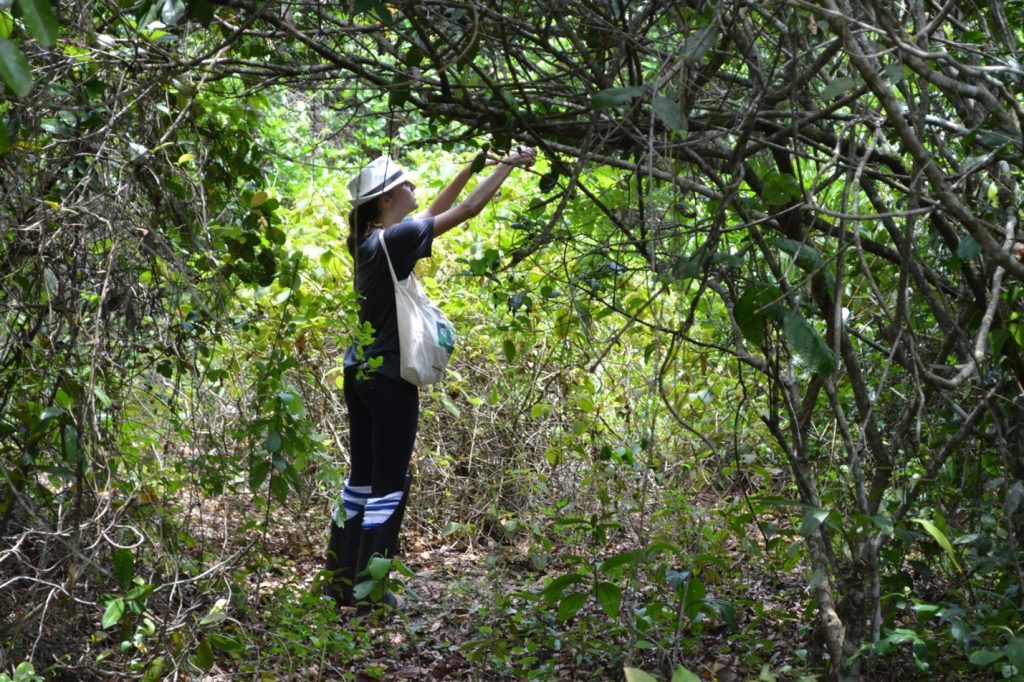By Patrick Farrar
UF Biology is highlighting the work and lives of several international graduate students in the department. These students face unique challenges and pressure from all sides, but have demonstrated endless fortitude and warrant special appreciation.
Maria Beatriz de Souza Cortez
Maria, a Ph.D. candidate in the Florida Museum Laboratory of Molecular Systematics and Evolutionary Genetics, is a self-motivated worker with a positive aura that fills the room.
She copes with stress from many sources: working on a Ph.D., living up to her own expectations, making her advisors and peers proud, missing her home country of Brazil along with her family and boyfriend who live there, and dealing with the implications of COVID-19 for her personal life and her research.
She reflected on completing her Master’s back in Brazil while living with her parents, and spoke candidly about her current difficulties.
“I had a lot of things that I don’t have right now. I totally underestimated the effects of living by myself, being alone, being far away from my family,” she said. “The pressure of the Ph.D. is really incredible.”
Maria planned on conducting field work in Brazil from the middle of March until the end of May, but the pandemic had other plans.
“Right on the week I was going, that’s when everything changed,” she said. “It was rough; I was so excited about doing field work, and I was excited about going to Brazil because I was missing my country, missing my family.”
Some of her work in Brazil would have involved plant hunting — in other words, scouring campos rupestres, or rock fields, for different begonia species. The region is high up in comparison with most of Brazil, between 700 and 2000 meters above sea level, and spread out. The rocky outcrops are special habitat for the country with many species that don’t exist anywhere else. The group of begonias she is interested in, Begonia Sect. Tetrachia, are found in several areas there.

“It’s a very unique place,” she said.
Maria looked forward to a certain research partner accompanying her and helping her look for plants: her mother. However, as field work in general now seems too risky, this plan also had to change.
“I’m not gonna carry her around the country in a pandemic. That’s my mom,” she said.
Considering that she may not be able to go to Brazil in person, she may ask herbaria, or plant libraries, to borrow some begonias. She could extract DNA from them and analyze how their genetic makeup varies in different regions.
Back in the states, Maria wants to use online data from Brazil to look at patterns of where different plant species occur in the campos rupestres.
Another part of her research examines a conflict of people and flowers. In her study region, there grows a group of plants with tiny papery flowers that people sell as ornamentals, the sempre vivas. They are touted for their endurance and occasionally dyed different colors.
However, they are also a threatened species that are restricted to small areas in the campos rupestres. In many cases, the proposed solution to this problem is for officials to draw a line around a large area where the flowers grow and call it a protected area.
“It’s not really the best way,” Maria said. “We become so caught up in that idea [of saving the plants and the environment] that we ‘forget’ that people live in these areas.”
She noted that forcing people to move from their land and homes is already a problem, not to mention that those people may not want to cooperate if they feel they have no say in the situation.
Maria is focusing on community-based conservation of these tiny flowers, trying to involve stakeholders at all levels to ensure a well-rounded solution.
“You really make sure that everybody is working for everybody,” she said.
Aside of her research, she truly enjoys teaching students and prioritizes their learning experience, even when her personal commitments and deadlines loom on the horizon.
“There is one thing that people say but they don’t say often enough: that if you’re not having fun, the students are not going to have fun,” she said.
Biking on the Hawthorne Trail, continuing to dance, and taking on singing lessons in her limited free time have all contributed to Maria’s ongoing success and ability to persevere; surely, her optimism has too.
“At the end of the day, I will adapt my dissertation project; I have to. It’s not my original plan, but it’s not the original plan for so many other graduate students, and it is not a life-and-death situation as it was and unfortunately still is for many people. At the end of the day, I am just lucky to feel supported by so many loving friends, family, advisors, and co-workers across Biology and the Museum,” she said.